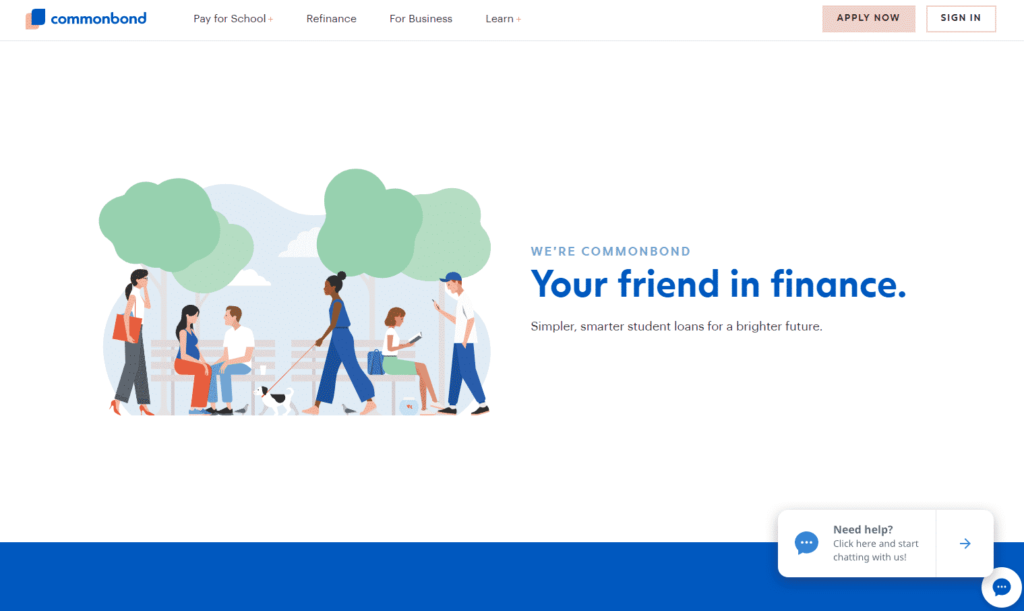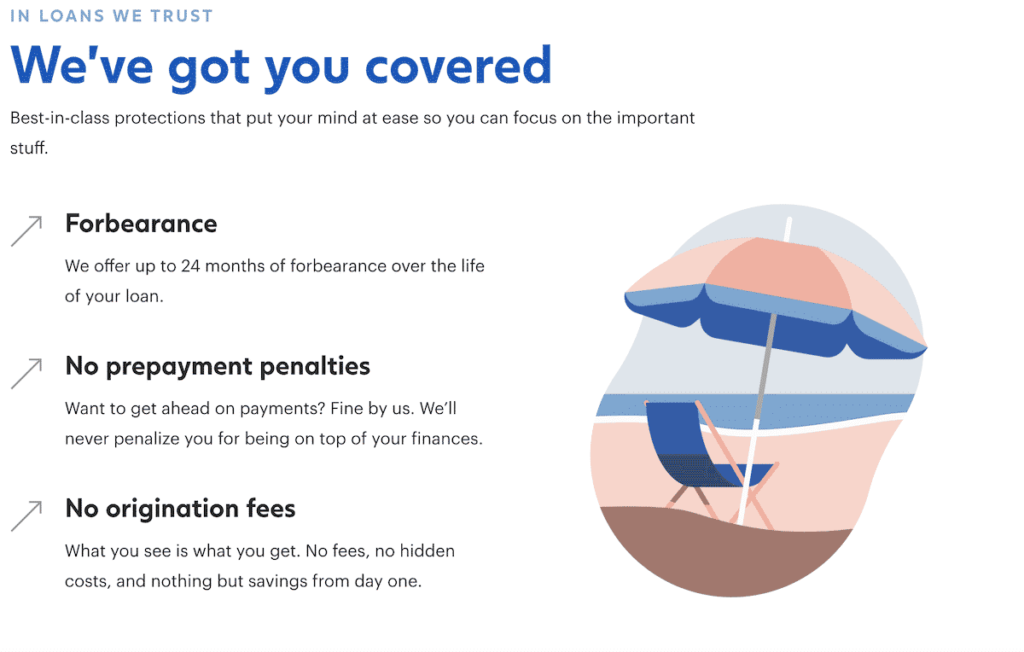Update: CommonBond stopped offering student loans in April 2022 and ended its student loan refinance program in May 2022. Now, CommonBond focuses only on loans for solar panels. The lender will continue to support its existing borrowers and said it will process open student loan refinance applications until June 1, 2022. If you’re looking for an alternative, check out our list of the best private student loans.
Still need student loans? Consider comparing offers from several lenders to get the best offer available for you.
If you’re looking for student loans, consider these lenders:
|
Primary Rating:
5.0
|
Primary Rating:
4.5
|
Primary Rating:
4.4
|
|
Pros:
|
Pros:
|
Pros:
|
- Min credit score: Mid 600s
- Fixed APR: 4.43 -17.99%
- Variable APR: 5.59-17.99%
- Min credit score: 660
- Fixed APR: 4.39-11.11%
- Variable APR: 5.84-11.11%
- Min credit score: Varies
- Fixed APR: 4.13% - 15.46%
- Variable APR: 6.16% - 16.10%
CommonBond Review

Looking for a legit CommonBond review? Saving thousands of dollars on your student loan debt seems ideal, and that's just what CommonBond promises. Is it legit, though?
CommonBond is your friend in finance. They provide simpler, smarter student loan loans for a brighter future. But is it the right student loan refinancing company for you? Let's find out, together in our CommonBond review.
What is CommonBond?
CommonBond is an online lender founded in 2012 that offers both student loan refinancing and private student loans.
CommonBond promises to jump-start your dreams with better loans & bigger savings. CommonBond members save over $24,000 on average and they don't have any application fees, forbearance options, or prepayment penalties. No hidden fees whatsoever.
They offer student loan Refinancing, Parent PLUS refinancing, and student loan benefits. But should you use it to refinance your student loans?

CommonBond Review Quick Facts
| Reviewed loan | Student loan refinancing |
| Interest rates | Fixed: 3.21% – 6.45% Variable: 2.02% – 6.3% Includes autopay discount of 0.25% |
| Loan terms | 5, 7, 10, 15 and 20 years for fixed- and variable-rate loans. 10 years for hybrid loan. |
| Loan amounts | $5,000 to $500,000 |
| Co-signer release available | Yes |
| Can transfer a parent loan to the child | Yes |
Pros
- CommonBond has low and transparent rates
- This company offers lower rates than other lenders in the student debt industry
- Conveniently offers a hybrid loan option
Cons
- To be accepted you must have graduated from college
- Not available in Mississippi or Nevada
Who is CommonBond Best For?
CommonBond is quickly becoming one of the largest providers of student loan refinancing and consolidation. CommonBond is good for refinancing or consolidating student loans for anyone that has a good or excellent credit score.
You'll need a minimum credit score of 660 and get approved. The company has one of the best forbearance policies and you can visit CommonBond to learn all of their options to see what they have for you.
Services Offered
Student Loan Refinance and Student Loan Consolidation
CommonBond Features
Forbearance, No Prepayment Fees, No Origination Fees, Auto Payment, Career Support, Cosigner Option
CommonBond Student Loan Refinancing Rates
- Fixed: 3.2% – 6.45%
- Variable: 2.02% – 6.03%
Includes autopay discount of 0.25%
You can get your student loan refinancing custom rate in 3 minutes or less.
CommonBond Loan Length
Loan Length: 5, 7, 10, 15, 20
You can get a loan through them for a 5, 7, 10, 15, or 20-year term. Speak to one of their representatives to figure out the best loan length that works for you.
CommonBond Loan Amounts
The company currently offers student loan refinancing and consolidation for loans over $5,000.
CommonBond Eligibility
To start refinancing your student loans, you must be a graduate. This seems to be the standard requirement for student debt companies, but there still are companies you can consolidate or refinance through if you did not graduate from college.
CommonBond Customer Service
One feature that is important is being able to get in touch with your student loan refinancing company. Sometimes it’s nice to talk to a real person. CommonBond has a U.S.-based care team is available by phone and live chat Monday–Friday, 9am–8pm EST, and you can email them anytime.
- Email: [email protected]
- Phone: 800.975.7812
Why Should You Refinance Your Student Loan Debt?
Are you wondering, should you refinance your student loans? When it comes to student loan refinancing, there's no one-size-fits-all answer. The best way to pay off your student loans depends on your individual financial situation. You'll need to consider factors like your current interest rate, the length of your repayment term, and your overall financial goals. Here are the reasons why you should:
1. It’s simple to check your rate and can save you a lot of money. There are a lot of competing student loan companies and that’s good for you. That means you can get the best possible interest rate which can save you a lot of money. The average user saves $18,668 when refinancing. You can check your rate for all of the lenders on this page in under 3 minutes.
2. If you have a high interest rate on your student loans. Fortunately, for many graduates, refinancing can be a great opportunity to help with loan payments. If you have federal or private student loans with an interest rate over 4%, then refinancing them will save you a lot of money. Student loans with 6.8% interest rates mean that you’ll need to pay $586 a month in interest alone for every $100,000 you owe. You could also refinance your student loans to a longer term to help lower your monthly payments.
3. If you don’t qualify for public student loan forgiveness. Public student loan forgiveness (PSLF) was created in 2007 in order to encourage graduates to pursue full-time work in public sectors including nonprofits and government organizations. If you are working in one of these fields, and have been consistent with your payments, it’s best to weigh your options and see if refinancing or PSLF will save you more money over the life on your student loan.
Student Loan 101 FAQs
What are FASFA requirements?
There are a few FASFA requirements, but generally, you'll need to be a US citizen or eligible noncitizen, have a valid Social Security number, and have graduated high school or earned a GED. You'll also need to demonstrate financial need.
How can I get out of student loan debt?
In order to get out of student loan debt, you'll need to repay your loans in full. You can do this by making payments on your loans, consolidating your loans, or enrolling in an income-driven repayment plan. You may also be able to get out of student loan debt through loan forgiveness programs.
Who are the best student loan servicers?
The best student loan servicers are those that provide the best customer service and support. The best student loan servicers include Navient, Nelnet, and Great Lakes.
Student Loan Resources
If you want to learn more about student loans before refinancing student loans with CommonBond, here are some good student loan resources to consider:
- Want to pay off your student loans and need an actual repayment plan? Here’s everything you need to know to get started.
- Looking for the top rated student loan refinancing companies? Find out the top rated student loan refinancing companies.
- In a position where you actually NEED more student loans? If so, do it the right way. Here’s how to find the best private student loans.
- Up to $250 Instant overdraft coverage
- With Instant, you can overdraw your Albert Cash account up to your Instant limit
- Costs $14.99 per month after a 30 day free-trial



